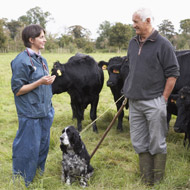Call for vets and farmers to work together on medicine storage

Vets and farmers are being urged to work together on medicine storage.
Researchers at the University of Bristol are calling on veterinary surgeons in the UK to work with farmers to remove expired and inappropriate medicines from farms and dispose of them appropriately.
Writing in Vet Record, the researchers describe a study in which they investigated medicine storage facilities on UK dairy farms. They found that while most farmers are storing their medicines appropriately, there is still room for improvement.
The study examined medicines stored on 27 farms in South West England and South Wales between September 2016 and October 2017. The most significant findings from the research were:
- most farms stored medicines in designated, lockable medicine cupboards
- there was a large variation in the quantity and types of antibiotics stored on farms
- highest priority critically important antimicrobials were found on 90 per cent of farms
- expired medicines, including antibiotics, were commonly found on farms
- medicines not licensed for use in dairy cattle were found on some farms.
"Our study has shown that most farmers are storing their medicines appropriately, but that there is variation between farms,” said Gwen Rees, Langford Trust, PhD scholar at Bristol Veterinary School. “This highlights just how important it is for veterinary surgeons to prescribe appropriately and help farmers ensure that the right animals are getting the right medicines.
"There is a need for open conversations - as part of routine health planning - around the use of expired medicines, medicines used under Cascade and the use of critically important antimicrobials, particularly in the current climate of increasing awareness of the global threat of antibiotic resistance."



 The Federation of Independent Veterinary Practices (FIVP) has announced a third season of its podcast, Practice Matters.
The Federation of Independent Veterinary Practices (FIVP) has announced a third season of its podcast, Practice Matters.